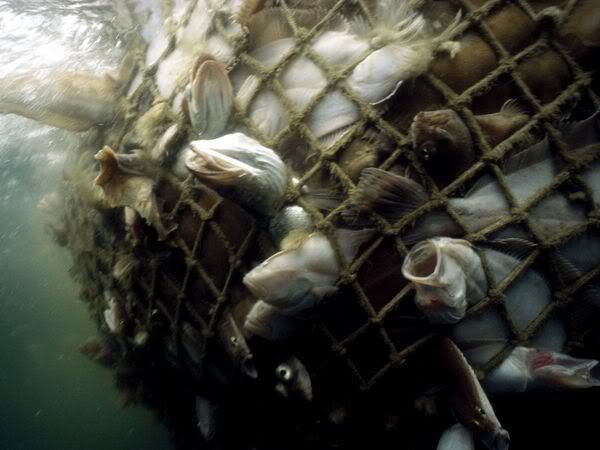Quote:
Originally Posted by charlie g

|
Sorry, Charlie, we accept only the finest tuna and you ain't it!
I do not "hate" Canadians, I simply wish for this senseless and cruel slaughter to stop and stop NOW.
It is total bullshit that killing the seals will cut down on the fishing catch.
Maybe stop OVER FISHING?
oh wait
THAT would make to much sense!
http://overfishing.org/pages/why_is_..._a_problem.php
"Why is overfishing a problem?
In the first chapter we already discussed that globally fishing fleets are at least two to three times as large as needed to take present day catches of fish and other marine species. To explain why overfishing is a problem we first have to get an idea on the scale of the problem. This is best done by looking at some figures published by the UN Food and Agriculture Organization. 1 The FAO scientists publish a two yearly report (SOFIA) on the state of the world's fisheries and aquaculture. 2 The report is generally rather conservative regarding the acknowledging of problems but does show the main issues. In general it can be stated that the SOFIA report is a number of years behind time of the real situation.
52% of fish stocks are fully exploited
20% are moderately exploited
17% are overexploited
7% are depleted
1% is recovering from depletion
The above shows that over 25% of all the world's fish stocks are either overexploited or depleted. Another 52% is fully exploited, these are in imminent danger of overexploitation (maximum sustainable production level) and collapse. Thus a total of almost 80% of the world's fisheries are fully- to over-exploited, depleted, or in a state of collapse. Worldwide about 90% of the stocks of large predatory fish stocks are already gone. In the real world all this comes down to two serious problems.
We are losing species as well as entire ecosystems. As a result the overall ecological unity of our oceans are under stress and at risk of collapse.
We are in risk of losing a valuable food source many depend upon for social, economical or dietary reasons.
The single best example of the ecological and economical dangers of overfishing is found in Newfoundland, Canada. In 1992 the once thriving cod fishing industry came to a sudden and full stop when at the start of the fishing season no cod appeared. Overfishing allowed by decades of fisheries mismanagement was the main cause for this disaster that resulted in almost 40.000 people losing their livelihood and an ecosystem in complete state of decay. Now, fifteen years after the collapse, many fishermen are still waiting for the cod to return and communities still haven't recovered from the sudden removal of the regions single most important economical driver. The only people thriving in this region are the ones fishing for crab, a species once considered a nuisance by the Newfoundland fishermen."
